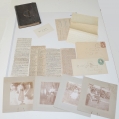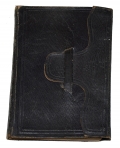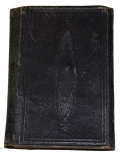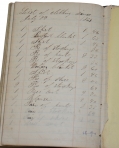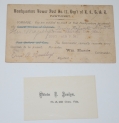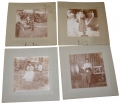site search
online catalog
18TH CONNECTICUT GROUPING - DIARY, LETTER, ENVELOPE COVERS, PICTURES, REGIMENTAL CLIPPINGS, ID’D TO PVT. GEORGE E. YOUNG OF CO. D
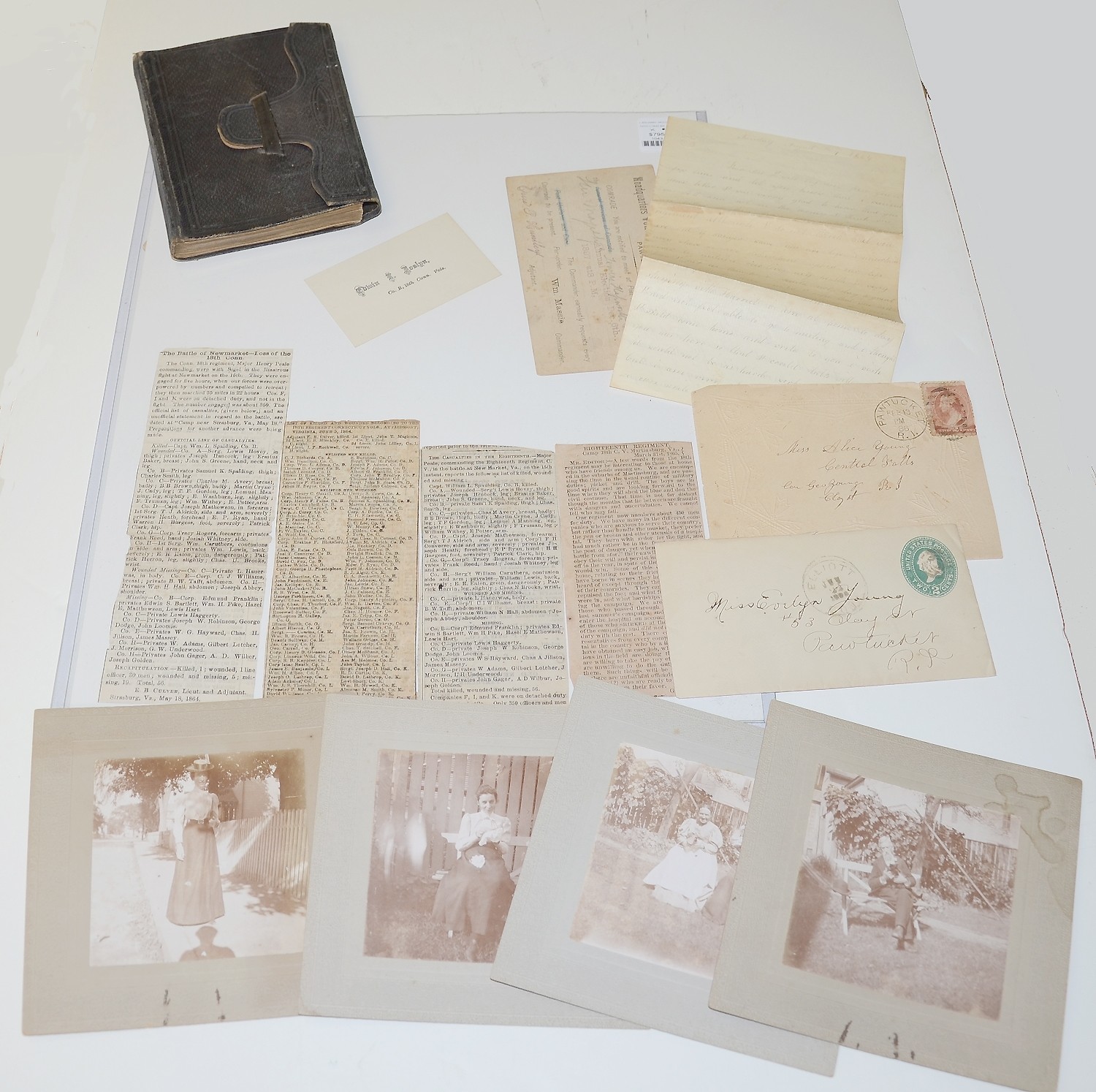
$795.00 SOLD
Quantity Available: None
Item Code: 1043-127
(1) The diary is a black leather, front-flap journal, 6 x 4”, w/lined entries in ink, dating from 8/16/1864 through 7/19/1865. Owner inscription, in ink, front eps - “Mr. George E. Young/ Abington/ Windham Co., Conn/ Co. D/ 18th Reg. Conn/ Volunteer.” Exhibits light wear and rubbing at the extremities, else VG.
(2) The four-page letter, written in ink on lined paper, 5 x 7.75”, from mother (signed “E. Young”) to son George is dated “August the 7th 1864.” Exhibit fold-marks and light soiling while remaining entirely legible. (3) The two “covers”, w/ 2 cent stamps are addressed to “Miss Evelyn Young” and “Miss Alice Young.” (3) The pictures include a contemporary xerox, 5 x 4.5”, of a clear tintype image of Pvt. Young in a standing studio pose, in uniform, in belted army overcoat w/cape and kepi. Other Young pictures include four small turn of the century cabinet cards images, 3.125” square, depicting out of doors shots of two younger women and an older and younger man. (4) Newspaper clippings list the losses of the 18th Conn. at Piedmont, VA, 6/5/1864, and the Battle of Newmarket, VA, 6/15/1864. Plus, a G.A.R. election notice and the card of of Pvt. Edwin L. Joslyn/ Co. B, 18th Conn. Vols. (POW 7/24/1864, Winchester, VA—Escaped 9/19/1864)
George E. Young was a resident of Thompson, CT, who was mustered as a private into Co. “D”, 18th CT., 8/18/1862; and was discharged on 6/10/1865. His unit mustered at Norwich, CT, 8/22/1862, was attached to the 8th Corps and the Baltimore Defenses, and, though the 18th CT saw action in Virginia, its operational base was primarily West Virginia through most of the War. The regiment’s most significant actions were the Battles of Winchester, VA, (June 13-15, 1863), New Market, May 15, 1864, and Kernstown, Winchester, July 24, 1864. At the close of the war it was mustered out at Harper’s Ferry, VA, 6/27/1865; during service the unit lost 71 men killed and mortally wounded, and 81 by disease for total of 152.
George Young’s diary covers his entire enlistment, running from August 16, 1862 to July 18, 1865. Writing in ink, Young’s syntax reveals him to be relatively educated, while his rough calligraphy requires patience to decipher. Then too, and while dating his entries—("Saturday 11th)—he sometimes omits the changes of months (and does some skipping of days, even skips months), can makes the chronology and the narrative difficult to follow. Nonetheless, he all along conveys a strong sense of the Union army life in camp and on march. And, he opens by stating the terms of his enlistment, with special attention to the finances, and will continue without fail to mention his paydays, and the dollars and cents down to the penny.
August 16—We were mustered into State service and received our uniforms and in the afternoon we had a young man named to drill us by the name of John Moss, in the afternoon J. Lummise and two other and myself were detailed to lay floor in tents…”
August 18—"We were mustered into United States service…”
August 19—“We signed the United States bounty roll…We also signed the State bounty roll and received $60 and also received on order from the town of Pomfret $100.
Of the first Battle of Winchester (May 13-15, 1863), in which most of the 18th CT was captured by Ewell’s Corps on its march toward Gettysburg, he has this to say:
“Friday 12th (as Ewell’s Rebs close in on Gen. Milroy’s Winchester command) I was on guard last night. Skirmishing was going on through the day and there (was) quite a fight out on the Strasburg pike. Drove the Rebs back and look 50 prisoners and brought to the Citty..”
Sauterday 13th…Skirmishing was going on all around. I was on guard that night and had some hard shiners that night and troops sleep in the rifel pits last night. All of the things were moved from the citty that day. Could be the merchants were buisy getting there things out as fast as possible. All the knapsacks belonging to our regiment were brought to the Citty and packed up in a pile there.
Sunday 14th…We left the citty about two oclock in the morning with the prisoners and went to the fort…skirmishing going on all through the day. Our Reg. made a charge on some rebs…and drove and took 11 prisoners…But about 6 oclock they opened on us in the rear of the fort in good ernist with there big guns…
Monday 15th…(trapped in the fort) About two oclock in the morning we wer ordered to march from the fort after the big guns were spiked and the amanition in the magazine wet and spilt they say. (trying to escape) We started on the Martinsburg rode but at erly dawn we were attacked by a force three times as large as ours. Our brig.(ade) fought until they were cut up badly and were obliged to surrender although many them got away—(Although the bulk of the 18th CT. was captured, Pvt. Young was among the remnant that escaped. Captured prisoners were paroled July 2, and exchanged October 1, 1863.) We were ordered to file to the left…and we did so. After we got a little ways we were ordered to march round in the rear of the enemy. The 116th Ohio was with us and we were under their colonel as a commander. We got around and nerely up to the enemy and address came that we were defeated and for us to retreat and we did. We made about 45 miles that day (marching for Harper’s Ferry).”
In early May 1864, Young experienced health problems with his throat and hearing, having his ears “syringed out” on the eve of the Battle of New Market, VA—May 15, 1864. Excused from the battle, his single entry concerning it runs as follows: “Seegle (Gen. Sigel) had a fight with Imboden’s cavalry force at N. Market. Our regiment was engaged and suffered considerable.” Young was then shifted to provost guard duty, transporting rebel prisoners, and would miss his regiment’s engagement at the battle of Kernstown, July 26th.
For the remainder of the war, Young reverts to recording standard army camp life and routine. Finally, on April 9, 1865, he notes that “Gen Lee surrenderd the Army of Northern Virginia to General Grant,” and, on April 15th, goes on to report that “nues came to us” that our President was shot (last) night and also this morning that old secretary Seward and son were dangerous wounded with a knife by a man who attempted to kill him. The flags were hung at half mast…all the buildings decked in mourning besides the hospital and many of the people wear crepe on their arms mourning for the loss of our president. Everything looks sad.”
And on to the end, where Young relates the bureaucratic hassle of getting his discharge papers (June 11) and his pay (June 12--$229). Finally arriving home in Connecticut the following day.
**
Mother Eizabeth Young’s letter to soldier son George. 4 pages, in ink, dated August 7, 1864, was written following George’s health problems and his shift to provost duty. Yellowed and faded, but entirely legible, it offers interesting perspectives from the civilian home front.
Dear Son…I received your letter. I was very glad to hear that you was not with the army. I think you are better off there than you would be in your regiment although I do not think you are in much danger where you are…I hope you will live to get home to your wife and friends…
I see in the paper the (Shenandoah) Valley is full of rebs a gathering their crops and I quess they will have hard fighting down there and I guess they will about finish the 18th regiment…Grants army did not meet with very great success when he undertook to blow up the rebs (referring to the Battle of the Crater, July 30, 1864)…
They don’t make out much getting substitutes or enlisting men about here, yet I think they will have to draft and that will make terrible mess. They are all trying to get clear some way. Sprague is scared half to death. He is afraid that he will be frafted again. A good many have been examined and got clear now. I don’t know whitther they will ever get many more out there or not. I exspect their will be fighting every where this fall when they choose their president. I should not care about voting any way…there was a funeral here yesterday and another to day. It was a child to day that was buried to day that was buried. The name was Colvin. The childs father is a soldier in the 18th regiment.
George do write as soon as you can after you get this. I want to hear from you often…I must bid you good bye with a great share of love and the best wishes of your mother/ E. Young.
In all a solid 18th Connecticut diary, covering the entire war, plus photo grouping. Documentation included. Photos & images in protective sleeve w/white card backing. Invites further research. [JP]
~~~~~~~~~~~~~~~~~~~~~~~~~~~~~~~~~~~
THIS ITEM, AS WITH ALL OTHER ITEMS AVAILABLE ON OUR WEB SITE,
MAY BE PURCHASED THROUGH OUR LAYAWAY PROGRAM.
FOR OUR POLICIES AND TERMS,
CLICK ON ‘CONTACT US’ AT THE TOP OF ANY PAGE ON THE SITE,
THEN ON ‘LAYAWAY POLICY’.
THANK YOU!
Inquire About 18TH CONNECTICUT GROUPING - DIARY, LETTER, ENVELOPE COVERS, PICTURES, REGIMENTAL CLIPPINGS, ID’D TO PVT. GEORGE E. YOUNG OF CO. D
For inquiries, please email us at [email protected]
Most Popular
Historical Firearms Stolen From The National Civil War Museum In Harrisburg, Pa »
Theft From Gravesite Of Gen. John Reynolds »
Cavalry Carbine Sling Swivel »
Fine Condition Brass Infantry Bugle Insignia »
featured item
ARMED CONFEDERATE LIEUTENANT COLONEL
This uncased eighth-plate tintype is a very clear studio view of a Confederate lieutenant colonel wear frock coat, narrow brim hat, gauntlets and tall boots. He has tilted his hat slightly to one side and wears a sort of tight-lipped smile. His… (1138-2029). Learn More »



